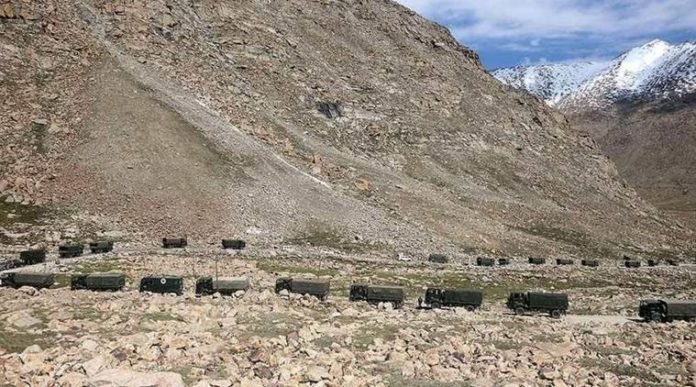New Delhi (NVI): India today reiterated its stand that China was responsible for the Galwan Valley face-off in Eastern Ladakh while saying that Beijing has been amassing a large contingent of troops and armaments along the LAC since early May, in violation of several border agreements, following which the Indian side had to undertake counter deployments.
The MEA statement came a day after diplomatic level talks between the two nations were held to defuse the border tension after a violent face-off between the Indian and Chinese troops in Galwan Valley on June 15. 20 Indian soldiers were killed in the bloody clashes as the Chinese side violated the disengagement process agreed upon at the Corps Commander level talks held in Moldo on June 6.
“At the heart of the matter is that since early May, the Chinese side has been amassing a large contingent of troops and armaments along the LAC. This is not in accordance with the provisions of our various bilateral agreements, especially the key 1993 Agreement on the Maintenance of Peace and Tranquility along the Line of Actual Control in the India-China Border Areas,” said MEA spokesperson Anurag Srivastava at a virtual press briefing here.
He said that the agreement notes in particular that ‘each side will keep its military forces in the areas along the line of actual control to a minimum level compatible with friendly and good neighbourly relations between the two countries’.
“Obviously, the Indian side had to undertake counter deployments and the resulting tension has thereafter expressed itself,” the MEA spokesman said.
“Respecting and strictly observing the Line of Actual Control is the basis for peace and tranquility in the border areas and explicitly recognized so in the 1993 and subsequent agreements,” Srivastava said, adding that Indian troops are fully familiar with the alignment of the LAC in all sectors of the India-China border areas and abide scrupulously by it.
“They have been patrolling all along the LAC, including in the Galwan Valley, for a long time. All infrastructure built by the Indian side has always been on its own side of the LAC. The Indian side has never undertaken any actions across the LAC and has never attempted to unilaterally change the status quo. However, that has not been reciprocated by the Chinese side and that from time to time has led to face-offs,” he said.
The MEA spokesman said that over many years, both sides have developed patterns of patrolling and it is reasonable expectation that patrols will not be obstructed in the discharge of their legitimate duties.
“Unfortunately, we have experienced in the last many years obstruction to patrolling that often accompany efforts to unilaterally change the status quo. To provide for situations
where the two sides encounter each other, a set of procedures and norms have been mutually agreed upon. These are reflected in a number of agreements and understandings. While there have been occasional departures in the past, the conduct of Chinese forces this year has been in complete disregard of all mutually agreed norms,” he added.
Srivastava said the deployment of large body of troops and changes in behavior has also been aggravated by “unjustified and untenable claims”. The recent shift in the Chinese position on the Galwan Valley is one example, he said.
The MEA spokesman further said that it is imperative that the established mechanisms are used by both parties to address the current situation.
“The meeting of the Working Mechanism for Consultation & Coordination on India-China Border Affairs (WMCC) yesterday was, therefore, a significant development. It was preceded by a discussion among senior military commanders on 22 June that focused on implementation of the understandings reached between them on 6 June 2020,” he said while referring to the diplomatic level talks held via video conference yesterday.
Srivastava also referred to the conversation between the Foreign Ministers of the two countries on 17 June, saying they had agreed that the overall situation would be handled in a responsible manner, and that the disengagement understanding of 6 June would
be implemented.
“We expect that the Chinese side to sincerely follow up on this understanding and ensure the expeditious restoration of peace and tranquility in the border areas,” he said, adding that a continuation of the current situation would only vitiate the atmosphere for
the development of the relationship.
-ARK








